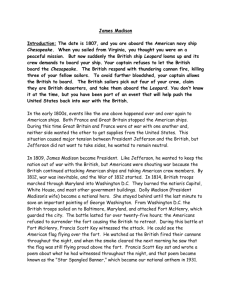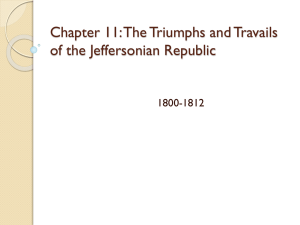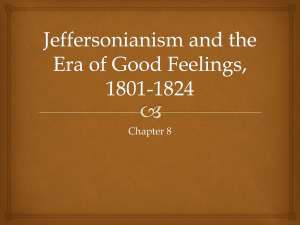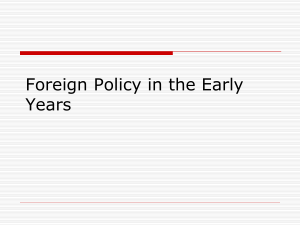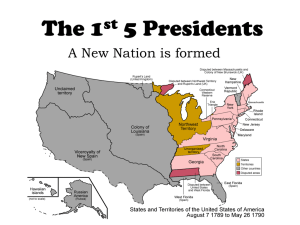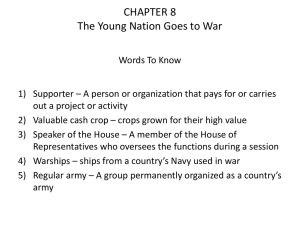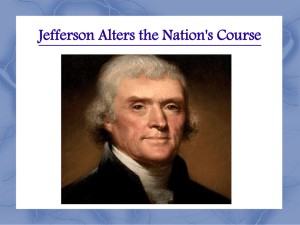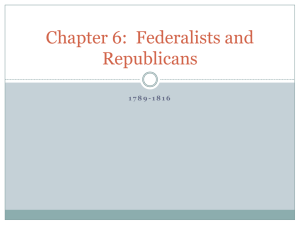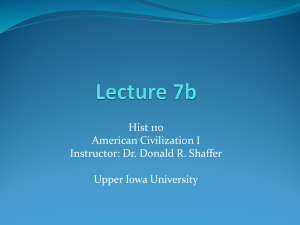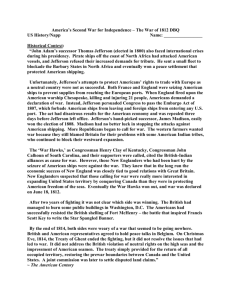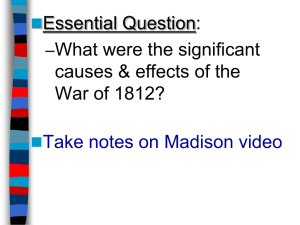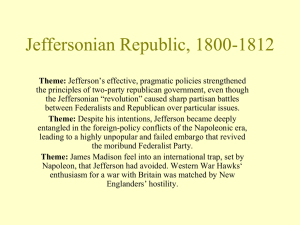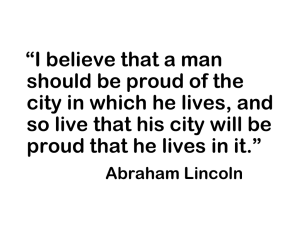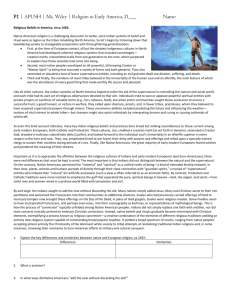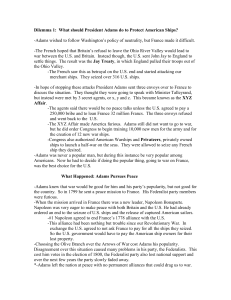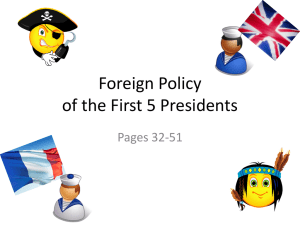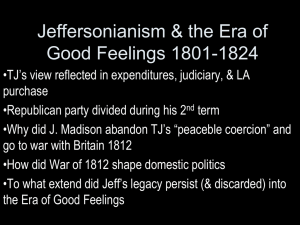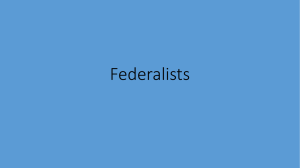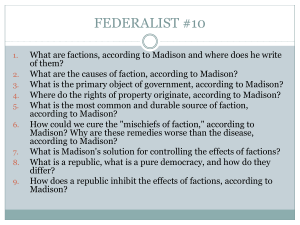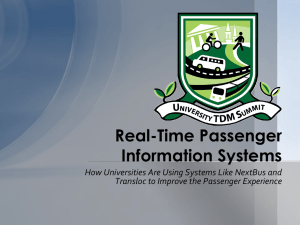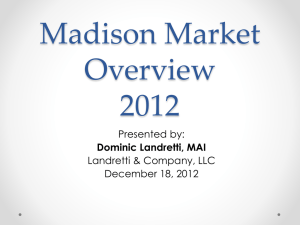Document
advertisement
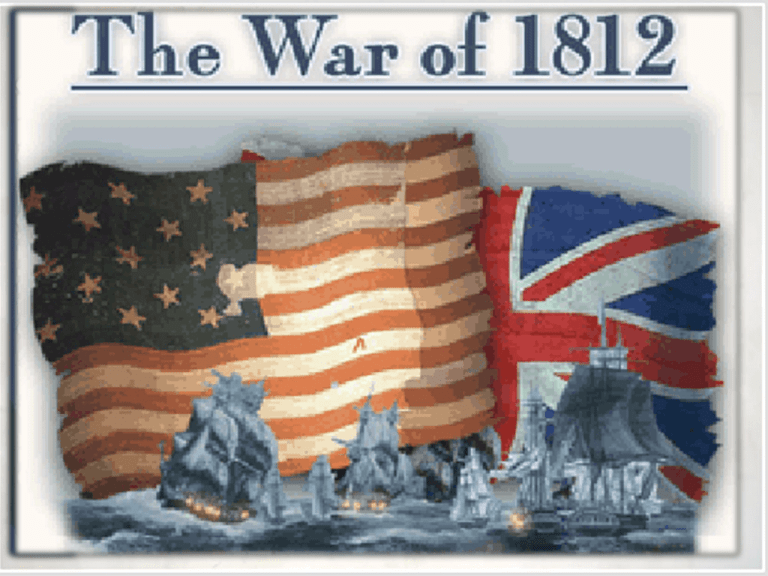
The evolution of foreign countries and their desire to impart their philosophical will upon North America has a long history. Prior to Columbus, there is documented proof that several European countries has explored North America and had attempted to extract the natural resources. The voyages of Columbus however becomes the watershed event when the two way exchange of resources, people and disease change the course of history. As England establishes its control along the east coast, other countries such as Spain, France and Portugal also attempt to lay claim to the land. Finally, the European descendants who established permanent communities in North America, which became known as the United States also found itself having to defend their boarders. Introduction The United States Foreign Policy As the first President of the United States, George Washington was well aware that this newly established country could not afford to get involved in the European conflict. It was Washington’s policy to stay neutral and not to side with either England or the two main international powers at that time. Washington knew, the US did not have the military might to fight a war or the financial means to get involved. When Adams became President, he also had to make some decisions. There was a great deal of political pressure from the Federalists to support England to help the trade business. Likewise the Democratic Republicans felt obligated to support France fro their past support. Adams finally had to act when it became obvious that France was attacking US ships, which led to the XYZ affair. Jeffersonian Foreign Policy John Adams did not win the White House for a second term. Thomas Jefferson narrowly beat out Aaron Burr in an election which saw the Democratic Republicans take over the country. The United Sates was now going to take a different direction under Jefferson. Jefferson’s fiscal program was intended to avoid international conflict so the country could work on lowering the national debt. The United States had just purchased the Louisiana Territory from France and set out to explore the newly acquired lands. In addition, the US had gained control over the port of New Orleans and the trade business up and down the Mississippi River was now monitored by the US. France was no longer a threat in the continental United States. However, England was still agitated after having lost the Revolutionary War some 25 years previous and made life miserable for the United States merchants. Major Events that Led to the War While Jefferson focused on established on domestic affairs, the US shipping merchants continued to harassed England. Britain required licenses for ships bound for Europe. England confiscated cargo from licensed ships and continued the practice of impressment of American sailors. Although many British sailors had become US citizens by deserting their British ships and joining American crews. British Navy would often kidnapped these sailors off American ships and force them to rejoin the British Navy. Jefferson’s attempt with economic diplomacy also failed miserably. The Embargo Act of 1807 halted all trade with Europe by placing a ban on trade with other countries. This had a devastating impact in the northern port cities which depended heavily on merchant trade. Madison takes over as President After Jefferson served two terms, it was James Madison’s who was elected the fourth President. Madison like Jefferson was also a Democratic Republican. He was also Jefferson’s Secretary of State and had been one of the main contributors to the writing of the Constitution. In March 1809, Congress replaced the Embargo Act of 1807 with another unenforceable Act in March 1809. This Act lifted all embargoes on American shipping except for those bound for British or French ports. The intent was to damage the economies of the United Kingdom and France. Like its predecessor, the Embargo Act, it was mostly ineffective, and contributed to the coming of the War of 1812. In addition, it seriously damaged the economy of the United States due to a lack of markets for its goods. Why Did Madison Want War? What were some of the benefits of going to war with Britain? To reestablish and protect the US trade business. To build up this idea of Nationalism. To stop the impressment of sailors. CANADA!!! What were some drawbacks to going to war? Not everyone in the US wanted to go to war. Military was small and they did not like to fight outside of their state borders. The Navy was also small with only 22 ships. Britain was a great Superpower. A loss would risk losing the territory that was gained in the Louisiana Purchase. Madison Declares War? On June of 1812 Madison asked Congress for declaration of war. The vote was split along regional lines. The war started with invasion of Canada. Right from the start Madison and the US leaders thought that the Canadians would welcome the Americans and would quickly join the US to expel Britain from North America. However, this did not happen. The US lost three battles inside of Canada. Ultimately, Admiral Perry defeated the British on Lake Erie . Britain Blockades the Eastern Seaboard which prevented shipping from leaving, and made the war more unpopular in the Northeast. The Burning of Washington DC? In August 1814, British forces sailed into Chesapeake Bay and ransack Washington D.C. They burn the White House and the Capitol Building. Madison and members of Congress barely escape. Dolly Madison escapes with the Portrait of Washington. However, unlike D.C., Baltimore was ready for the British. The City militia inflicted heavy casualties on the British. After bombarding Fort McHenry on September 13, 1814 the British abandon the attack. Francis Scott Key witnessed the bombardment and penned a poem which becomes the National Anthem. The Conclusion of the War? The Treaty of Ghent was signed on Dec. 24, 1814 ending the war of 1812 with the War ending in a stalemate. The issue of impressment was not addressed, but faded on its own. The Battle of New Orleans was fought after the Treaty of Ghent was signed (but not ratified). Pirates and Frontiersman fought alongside US troops which made Andrew Jackson a national hero and household name. The Outcome of the War? If The War of 1812 ended in a tie, why was it important? It gave the United States a National Identity. The United States was able to hold it’s own against the British. The fight with England was over and the US was finally being recognized as a viable nation in the eyes of the international community. It also reinforced and encouraged the the westward expansion. It started an era of positive relations and trade with England. Created a hero in Andrew Jackson and the Western Frontiersmen. Oh, say can you see by the dawn's early light What so proudly we hailed at the twilight's last gleaming? Whose broad stripes and bright stars thru the perilous fight, O'er the ramparts we watched were so gallantly streaming? And the rocket's red glare, the bombs bursting in air, Gave proof through the night that our flag was still there. Oh, say does that star-spangled banner yet wave O'er the land of the free and the home of the brave? On the shore, dimly seen through the mists of the deep, Where the foe's haughty host in dread silence reposes, What is that which the breeze, o'er the towering steep, As it fitfully blows, half conceals, half discloses? Now it catches the gleam of the morning's first beam, In full glory reflected now shines in the stream: 'Tis the star-spangled banner! Oh long may it wave O'er the land of the free and the home of the brave! And where is that band who so vauntingly swore That the havoc of war and the battle's confusion, A home and a country should leave us no more! Their blood has washed out their foul footsteps' pollution. No refuge could save the hireling and slave From the terror of flight, or the gloom of the grave: And the star-spangled banner in triumph doth wave O'er the land of the free and the home of the brave! The Star Spangled Banner Oh! thus be it ever, when freemen shall stand Between their loved home and the war's desolation! Blest with victory and peace, may the heav'n rescued land Praise the Power that hath made and preserved us a nation. Then conquer we must, when our cause it is just, And this be our motto: "In God is our trust." And the star-spangled banner in triumph shall wave O'er the land of the free and the home of the brave!
